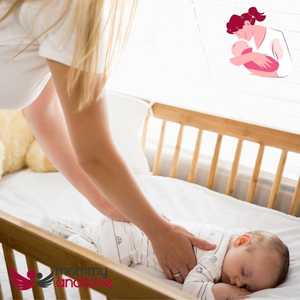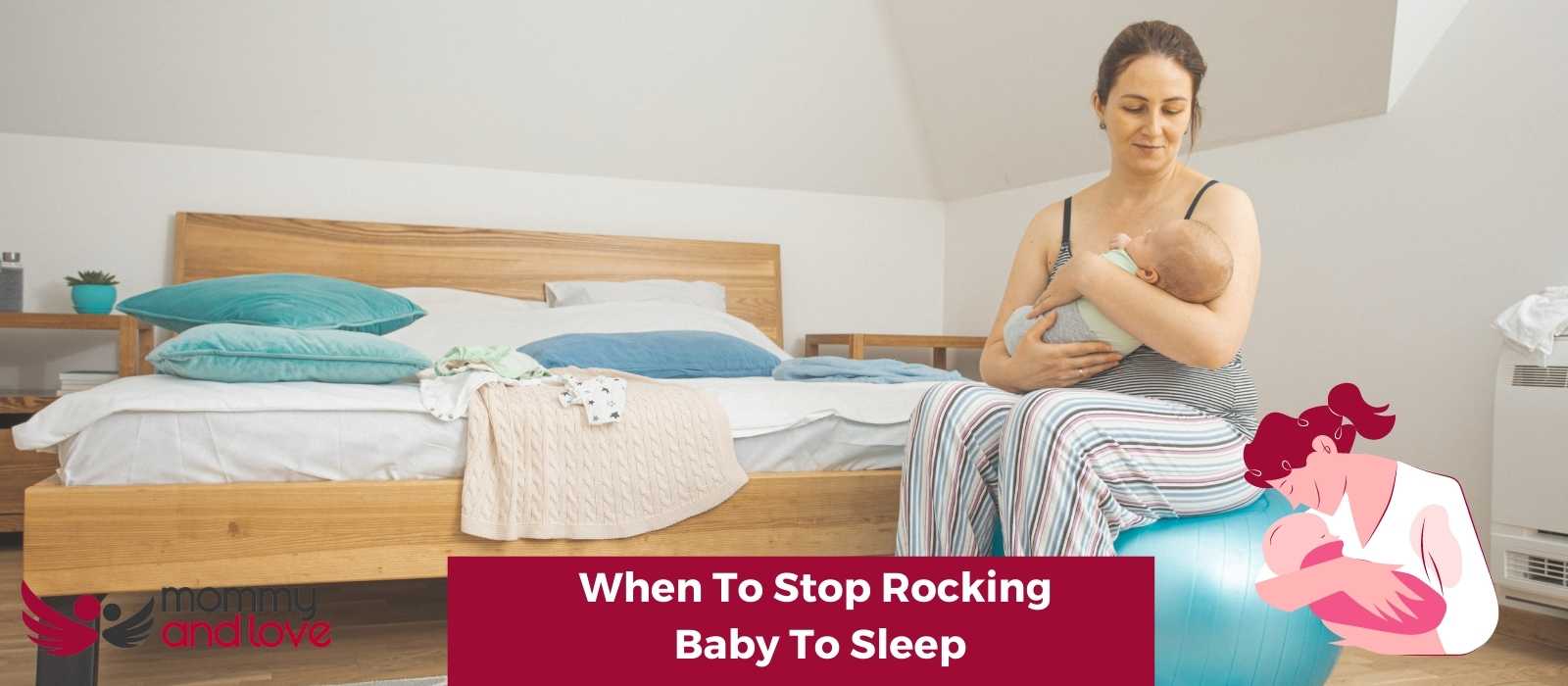If you’re like most parents, you’ve probably rocked your baby to sleep at some point. It’s a natural thing to do, and it seems to work well for both baby and parent.
But is there a time when you should stop rocking your baby to sleep? And if so, what’s the best way to make the transition?
There is no one right answer to the question of when is the right time to stop rocking a baby to sleep. Families must make their own decision, based on what feels best for them. However, the six-month mark is usually a good time to break the habit.
There is a point at which parents should stop rocking their baby to sleep, as this might encourage them to learn how to fall asleep on their own. For instance, when babies start sleeping through the night. Some researchers believe that rocking can be an ineffective habit and babies may rely on it in order for them to sleep soundly.
Does Rocking Help the Baby Sleep?

Rocking can be a great way to help a child fall asleep. It’s a natural movement that is soothing and calming, helping babies fall asleep.
This is especially true in baby rocking bassinets and smart bassinet like the SNOO, where the gentle back-and-forth motion can really help your baby sleep.
Rocking is one of the most common onset sleep associations and can be great for helping an Overtired Baby Catch Up On Sleep. This means babies associate rocking with sleeping, so you would have to recreate the exact environment they fell asleep. This can be beneficial when they are young but not so much as they grow older when baby sleep habits change of if you are trying To Put A Fussy Baby To Sleep.
If you’re trying to help your baby boy or baby girl sleep and rocking isn’t doing the trick, don’t worry. Every baby is different, so it may take some trial and error to figure out what will work for your little one. But keep trying different techniques – including rocking – and eventually, you’ll find the perfect formula for a good night’s sleep.
Safely Rocking to Help a Baby Fall Asleep

There are many ways to rock a baby to sleep safely, but one of the most popular methods is by rocking them back and forth gently.
Some parents prefer to stand and sway from side to side while holding their babies in their arms. Others might sit in a rocking chair while cradling the baby in their arms and gently rock back and forth.
Parents can rock babies without holding them using various types of furniture. One of the earliest rocking innovations is the cradle. Newer devices, such as automatic rocking seats and swings, also provide a baby with mild rocking.
These gadgets, however, are intended for brief, supervised usage and should not be used in place of a crib, bassinet or bed with a flat sleeping surface for an extended period of time or for sleep.
When to Stop Rocking Your Baby to Sleep?
Generally speaking, it’s recommended that caregivers stop rocking a baby to sleep once the baby begins learning how to sleep through the night. This usually happens around the 6-month mark, but every baby is different.
How Do I Wean My Baby off Rocking to Sleep?

Most parents assume that rocking a baby is what a loving parent is all about. And most of them don’t mind rocking their babies to help them to sleep.
But, like all good things, there is a time it must come to an end!
There are a few different ways that you can wean your baby off of rocking to sleep at night. In some cases, a sleep training method can also help.
- You can try to slowly decrease the amount of time that you rock them, or you can try to put them down to bed drowsy but awake and let them fall asleep on their own. Don’t worry if he’d wake up, this is normal. It takes a few nights before she’ll learn and fully adjust to this new sleeping routine.
- Introduce other calming methods such as a relaxing scent, white noise, and rhythmical music alongside mild rocking. Sometimes these things can help most babies stop crying. They also help your baby learn to put himself to sleep at night all by himself without being rocked to sleep.
- If you decide to slowly decrease the amount of time that you rock your baby to sleep at night, you can start by putting them down for naps and bedtime 10 minutes earlier than usual. Then, each day, you can add an additional 10 minutes. Eventually, your baby will be able to fall asleep on their own without being rocked to sleep at night.
- Sleep train your baby by putting her down awake and letting her fall asleep on her own. You may want to start by doing this for naps. Put your baby in their crib when they are sleepy, but not yet asleep.Allow them to fuss or cry for a few minutes before going in to soothe them. Once they are used to falling asleep on their own for naps, you can start doing this for bedtime as well.
- The Camping out sleep training method can help children learn how to sleep independently. This happens by gradually increasing the distance between the parent and child.To use this method, parents will need to sit in a chair near their child’s own crib at bedtime. They will then stay with their child until they fall asleep. Each night, the parent will move the chair a little bit further away from the bed. The goal is to eventually have the parent sitting outside the child’s bedroom door.This method can take a few days or weeks to work, but it is often successful in helping children learn how to fall asleep on their own.
Conclusion on Rocking Babies to Sleep
If you’re looking for a way to help your little one drift off to dreamland, rocking may be the answer. It’s a natural movement that soothes and calms many babies, which can make it easier for them to learn to fall asleep on their bed.
However, you should eventually stop rocking a baby to sleep once the baby begins learning how to sleep through the night. This usually happens around 6 months, but every baby is different.
FAQ on Rocking Babies
Can Rocking a Baby to Sleep Cause Shaken Baby Syndrome?
Most parents rock their babies to sleep at some point. It’s a gentle, calming way to help your baby sleep. But could this common practice actually be dangerous? Some people believe that rocking a baby too vigorously could lead to shaken baby syndrome (SBS).
SBS is a very rare condition that occurs when an infant is shaken so violently that their brain and spinal cord are damaged. It is most often caused by abusive head trauma, not gentle rocking.
So, if you’re looking for a safe and soothing way to help your baby sleep, rocking is a great option. Just be sure to do it gently and never shake your baby.
When Do Babies Form Bad Sleep Habits?
By six months old, babies have learned a lot of new abilities that can make it difficult for them to sleep. This includes the ability to keep themselves awake and resist falling asleep in noisy or light-filled environments. Frequent wake-ups and night waking can happen as well.
Another good example, they can start to crawl and explore their environment. This means that they may not be able to stay in one place for long periods of time, which can make it hard for them to settle down and go to sleep even if they’re tired.
Additionally, around this age babies start to develop separation anxiety, which can also interfere with their sleep and make it harder for them to get back to sleep when they wake up in the middle of the night.
If your baby is having difficulty sleeping or has other sleep problems, it’s worth spending the time helping them break these bad habits. Remember that bad habits and sleep problems don’t only affect your baby, it also affects your own health and well-being.
How to Develop Healthy Sleep Habits in Babies?
It is important to develop healthy sleep habits in babies for several reasons.
- Poor sleep can lead to health problems in later life.
- Bad sleep habits can be difficult to break.
- Developing good sleep habits will help your baby (and you!) to get a good night’s sleep.
There are several things you can do to promote healthy baby sleep habits.
- Establish a consistent bedtime routine. This might include a bath, followed by some quiet playtime, and then story time before bed.
- One great advice is to create a safe and comfortable sleeping environment for your baby. Make sure the room is not too hot or too cold, and that there are no loud noises or bright lights. A quiet, dark room always helps babies sleep and stay asleep, with less awake time in between.
- Put your baby down to sleep in the crib awake but drowsy. This will help them to learn to self-settle and to get used to sleeping in their own bed.
- Wait a few minutes before entering your baby’s room when your baby wakes. Let your baby cry it out for a bit. This will help your little one learn how to self-soothe and put himself back to sleep on his own.
- If your baby routinely falls asleep during your night feeds, it’s a good idea to start feeding her earlier than usual to stop the sleep association of feeding with the bedtime routine. Feeding the baby before they go to sleep also helps reduce the number of times they need to wake up to being hungry.
- Consider sleep training. There are different methods that can help your baby fall back to deep sleep between transitions during sleep cycles. Aside from helping babies sleep on their own, it also helps them get more sleep which means fewer night wakings. If they wake up in the middle of the night, they will know how to put themselves back to sleep.
What Are Some Ways to Make Falling Asleep Easier for a Baby?
Here are a few ways to make falling asleep easier for your baby:
- Swaddling tends to soothe babies. It can help babies feel secure and cozy, which can make them fall asleep more easily.
- Another way to help a baby sleep is by dimming the lights in their room. This can signal to the baby that it is time to sleep.
- A gentle massage or any light, repetitive movement like swaying or swinging can help soothe a baby and make them more likely to fall asleep
- Using a white noise machine can also help a baby fall asleep. The sound of the machine can help to block out other noise and create a calming environment for the baby.

This article was written by: Gian MIller – Full-Time Writer, Baby Whisperer & Dad of 3.
Gian spends a lot of his time writing. A self-proclaimed baby whisperer, Gian has been through it all with his own children and is passionate about sharing his hard-won wisdom with other parents. When he’s not writing or changing diapers, you can find him playing the guitar or watching baseball (or preferably both at the same time).




